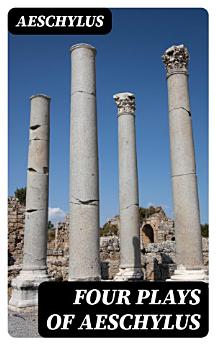Four Plays of Aeschylus
Aeschylus
វិច្ឆិកា 2022 · DigiCat
សៀវភៅអេឡិចត្រូនិច
113
ទំព័រ
family_home
មានសិទ្ធិ
info
reportការវាយតម្លៃ និងមតិវាយតម្លៃមិនត្រូវបានផ្ទៀងផ្ទាត់ទេ ស្វែងយល់បន្ថែម
អំពីសៀវភៅអេឡិចត្រូនិកនេះ
In "Four Plays of Aeschylus," the seminal Greek playwright Aeschylus presents a profound exploration of themes such as fate, justice, and the divine, framing these elements through the lens of his masterful use of dramatic structure and stinging dialogue. This collection includes pivotal works such as "Agamemnon," "The Libation Bearers," "The Eumenides," and "The Persians," illustrating his ability to weave complex narratives that challenge the moral compass of society. With its poetic language and innovative theatrical techniques, Aeschylus not only set the tone for future tragedies but also captured the societal anxieties of post-war Athens, thereby creating a lasting impact on the genre. Aeschylus, often referred to as the father of tragedy, was deeply influenced by his experiences in the Greco-Persian Wars and the nascent Athenian democracy. His works reflect his commitment to addressing ethical dilemmas and the human condition, derived from both his personal convictions and his desire to engage the Athenian populace in critical self-reflection. These elements in his writing reveal an author who was not only a playwright but also a philosopher of his time. I highly recommend "Four Plays of Aeschylus" for anyone interested in the origins of Western drama and the intricate interplay of human emotions and societal obligations. This anthology not only offers a glimpse into ancient Greek life but also serves as a timeless reflection on themes that continue to resonate today, making it essential reading for both students and lovers of literature.
អំពីអ្នកនិពន្ធ
Aeschylus (c. 525/524 – c. 456/455 BC) was an ancient Greek tragedian, often recognized as the father or the founder of tragedy. Aeschylus was born into a noble family near Athens and participated in the Persian Wars, an experience that influenced his art profoundly, infusing it with a passion for themes like civic duty and the suffering of war. His playwriting career began to flourish after his first victory at the City Dionysia, a festival in Athens where playwrights competed, around 484 BC. He is said to have written around 70-90 plays, but only a fraction have survived. His extant works, including the notable collection 'Four Plays of Aeschylus,' which comprises 'The Persians,' 'The Seven Against Thebes,' 'The Suppliants,' and 'Prometheus Bound,' showcase the evolution of Greek drama and its form. It is under scholarly debate whether Aeschylus was the true author of 'Prometheus Bound,' but its attribution to him by ancients gives it a place in his corpus. Aeschylus's contribution to literature is characterized by his introduction of the second actor, effectively inventing dialogue by reducing the chorus's role and pioneering the dramatic structure still used today. His work is marked by a grandeur of language and a profound exploration of human destiny, notably within the context of divine will and justice. Over the centuries, Aeschylus's tragedies have had an enduring impact on the canon of Western literature and continue to be studied and performed for their powerful portrayal of human emotions and ethical dilemmas.
វាយតម្លៃសៀវភៅអេឡិចត្រូនិកនេះ
ប្រាប់យើងអំពីការយល់ឃើញរបស់អ្នក។
អានព័ត៌មាន
ទូរសព្ទឆ្លាតវៃ និងថេប្លេត
ដំឡើងកម្មវិធី Google Play Books សម្រាប់ Android និង iPad/iPhone ។ វាធ្វើសមកាលកម្មដោយស្វ័យប្រវត្តិជាមួយគណនីរបស់អ្នក និងអនុញ្ញាតឱ្យអ្នកអានពេលមានអ៊ីនធឺណិត ឬគ្មានអ៊ីនធឺណិតនៅគ្រប់ទីកន្លែង។
កុំព្យូទ័រយួរដៃ និងកុំព្យូទ័រ
អ្នកអាចស្ដាប់សៀវភៅជាសំឡេងដែលបានទិញនៅក្នុង Google Play ដោយប្រើកម្មវិធីរុករកតាមអ៊ីនធឺណិតក្នុងកុំព្យូទ័ររបស់អ្នក។
eReaders និងឧបករណ៍ផ្សេងទៀត
ដើម្បីអាននៅលើឧបករណ៍ e-ink ដូចជាឧបករណ៍អានសៀវភៅអេឡិចត្រូនិក Kobo អ្នកនឹងត្រូវទាញយកឯកសារ ហើយផ្ទេរវាទៅឧបករណ៍របស់អ្នក។ សូមអនុវត្តតាមការណែនាំលម្អិតរបស់មជ្ឈមណ្ឌលជំនួយ ដើម្បីផ្ទេរឯកសារទៅឧបករណ៍អានសៀវភៅអេឡិចត្រូនិកដែលស្គាល់។








